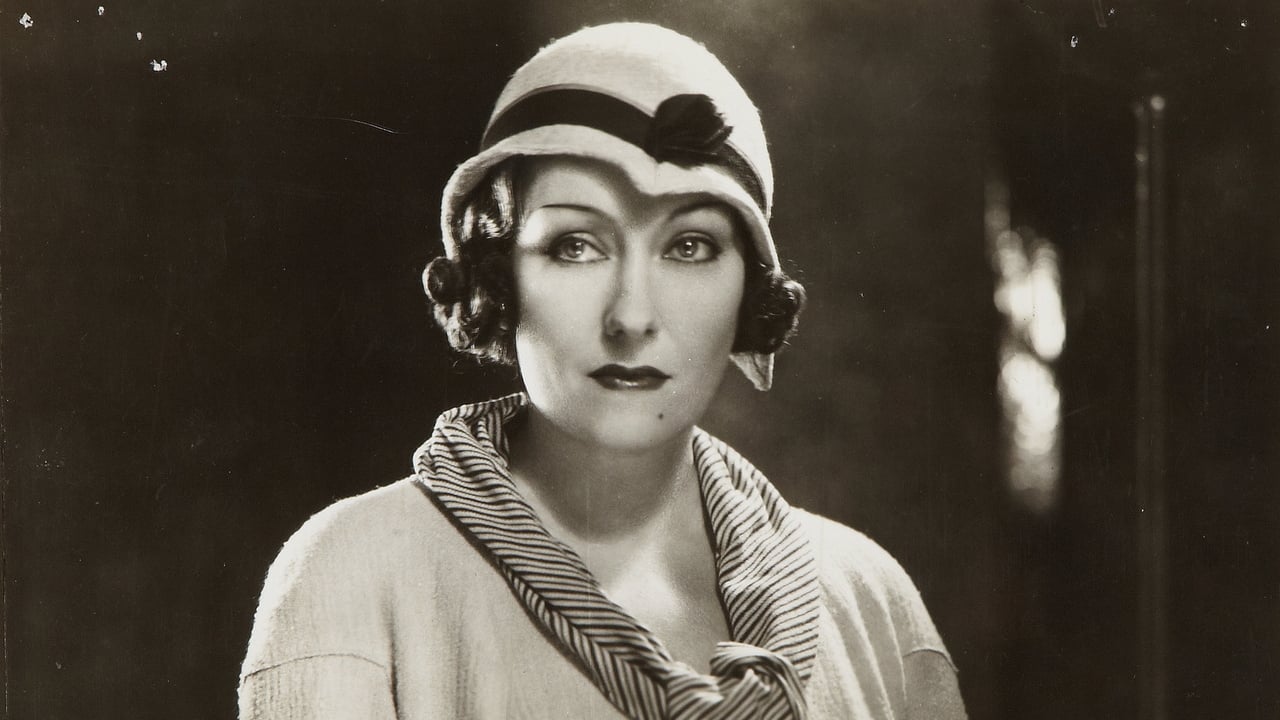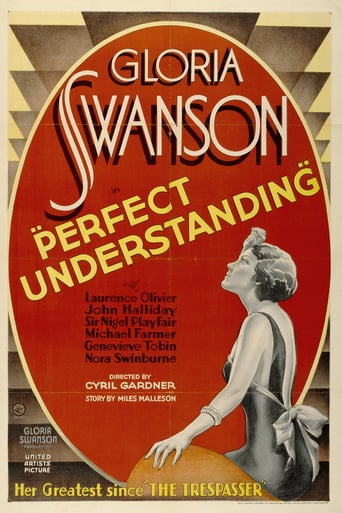

"Perfect Understanding" is a love story – not a romance, but a story of real love. And, it's about faithfulness and infidelity, jealousy and hatred, and forgiveness and happiness. The story takes place in 1933. The setting is among the wealthy in England and on the playgrounds of Europe. The leads are an American heiress and a landed Englishman who have met and fallen in love. Gloria Swanson plays Judy Rogers, who has come to England after her recent inheritance. Laurence Olivier is the wealthy Englishman, Nicholas Randall, whom Judy has fallen for. He is the nephew of Lord Portleigh (played by Nigel Playfair). Naturally, there's a love triangle in the person of Lady Stephanie Fitzmaurice. She's the woman "destined" for Nick before Judy came along. Yet, she has been married to Sir John Fitzmaurice for some time. The plot has an interesting twist in one of the characters, Ivan Ronnson. Played by John Halliday, he is a world explorer who goes off for years at a time on adventures of discovery. Apparently, he's a friend of Lord Portleigh. Ronnson is an observer of the goings-on. While being a member of the cast, he's always on the sideline -- never in the thick of things. He feels love for Judy. While he adds a philosophical overtone to the plot, he's also a potential third member of another love triangle – being the other man in Judy's life. As filmed in 1933, this movie is a bit heavy with melodrama. It seems to have carried over some of the old techniques of the silent film era that don't serve up well with sound. The first is the heavy musical score and crescendos to emphasize dramatic scenes or spots in the story. The second is the overly long panning, with no dialog, to close-ups of characters – in this case, Judy, for dramatic effect. Some of the technical production is not the best, and the script at times seems unnecessarily and laboriously slow. The acting is very good and a nice look especially at a young Laurence Olivier in only his seventh film. Both he and Swanson give very good performances here, but not exceptional ones. Olivier was age 25 when "Perfect Understanding" appeared on the silver screen. Swanson was old enough to be his mother and about to turn 44. They are a fine match here, but without his mustache, he likely would have had a much more boyish appearance that would have contrasted with the more mature (though quite beautiful) appearance of Swanson. The better significance of this film is that it is a fine morality play. The story shows many things well. The harm that infidelity does to a marriage based on deep love. The hurt, confusion and distrust that come from infidelity. It's interesting in that the greatest jealousy comes from the one who has been the betrayer. Nick becomes incensed with jealousy after he was unfaithful. It is a fine portrayal of dealing with hatred and having love restored through suffering, faithfulness and forgiveness. This film does pack a lot into what seems to be a nice simple love story on the surface. There are some other subtleties here worth mentioning. I wonder about the very release of this movie in 1933. Most the world was reeling from the effects of the Great Depression. That included England and the rest of Europe, as well as the Americas. So, here's a film about the very wealthy who seem oblivious to the world around them, except for how they might enjoy it. How did audiences receive a film like this at that time? Few people in the world would be able to take a honeymoon all around Europe that lasted for many weeks. And then there is the hedonistic lifestyle shown in Cannes on the French Riviera. The wealthy youth in the Cocktail Regatta were a sharp contrast to the reality of life for the vast majority of the world's peoples. Some of the films made about the high life of society in New York and elsewhere during the Depression could be seen as uplifting spirits. They were about good times that the everyday people could dream about or imagine as possible one day. And they usually involved people having a fun time with comedy and romance. Not so this movie and its setting. The movie has some philosophical and other interesting lines. The Quotes section on this IMDb Web page for the film has those bits of dialog. Here's a description of some of the "fun" to be had at the playground for the rich of the day, at Cannes, France. Miles Malleson plays The Announcer for the Cocktail Regatta. He explains the event: "Now the object of the race is suicide. The competitors line up here at the bar. They swallow their cocktails They swim out to their boats and they start up the motors, with luck. Then they make for At the raft there, they pick up more cocktails. Ah, yes, they do. Then they head across to the island where, if still conscious, they have yet more cocktails. And from there they head back to the finish here, if there is any. And let there be no moaning at the bar when they put out to sea."
... View MoreGloria Swanson had formed a film company just to make this film. Unfortunately, this is precisely the type of film that her most famous character, Norma Desmond, likely wanted to make in Sunset Boulevard. It is really a silent film with dialog replacing the text screens. The actors make grand extravagant gestures, turn their faces to and fro while fluttering their eyelids. The incessant music swells at appropriate moments to indicate high drama. The dialog seems like a nuisance to be summarily added and neglected - after all Swanson had done pretty well for all those years without dialog - why worry about that now.The quite modern premise of the film, a semi-open marriage, and the conflict brought on by the juxtaposition of the end of the flapper era avant-garde attitudes with the conservative Victorian mores ensconced in the judicial attitude towards divorce should have made the film more interesting that it was.However, the only real interest and tension is generated by incredible boat race where cocktails are drunk at every station to make the race more difficult! Prohibition was about to be repealed and the celebration of alcohol consumption in such stark contrast to today's attitudes is fascinating.Tighter editing, better pacing and dialog might have made this worthwhile. As is, it is a curio from the early years of sound, and of interest to the historian and perhaps to the film buff as a primer on the world of Norma Desmond.
... View MoreIn England, American designer Gloria Swanson (as Judith "Judy" Rogers) and London playboy Laurence Olivier (as Nicholas "Nick" Randall) are madly in love. To insure marriage won't ruin their bliss, they decide to wed with a unique "Perfect Understanding" contract. The pledge is, "Never to be husband and wife, but lover and mistress - and above everything else, to remain individual." After the honeymoon, Ms. Swanson decorates their London apartment while Mr. Olivier vacations in Cannes with friends Michael Farmer (Swanson's real-life husband) and Genevieve Tobin (as George and Kitty Drayton)...The men show off chests in the new style of swimming trunks...Before a boating race, Olivier drinks too much and beds ex-lover Nora Swinburne (as Stephanie). Consequently, Swanson must consider Olivier's request for forgiveness while being tempted to accept an invitation for extra-marital sex with John Halliday (as Ivan Ronnson). One of the biggest "silent" stars of the 1920s, Swanson made a successful transition to "talkies" - but audiences did not return to see her in roles like this. Accompanied by frequent dramatic flourishes of music, she makes little progress abandoning silent manners; ironically, "Sunset Boulevard" (1950) took full advantage of these skills.**** Perfect Understanding (2/24/33) Cyril Gardner ~ Gloria Swanson, Laurence Olivier, Michael Farmer, Genevieve Tobin
... View MoreBy the time that Gloria Swanson made this film it was clear that her screen career was in terminal decline and that the only way of continuing to make films was to finance them herself.this film is truly awful and there is not one good thing to say about it.Swanson acts at times as if she is still making a silent film with too much overreacting.Olivier is at his mannered worst.Only a great director like Wyler could teach him how to act for the camera.The music is loud and intrusive in the worst traditions of mickey mousing.As for the script well that is laughable.It is totally implausible.The climax in the Divorce Courts is ridiculous.The idea that in the middle of a Court hearing one partner decides he loves the other too much and cant go through with it is more suited to an Aldwych farce.It is one of the few failings of this otherwise excellent site that fans of stars can see no wrong in their favourite and feel that they must give every film they appear in a 10.If you are a fan of Swanson you will probably like this ,if not well it is only worth watching for its curiosity value.
... View More